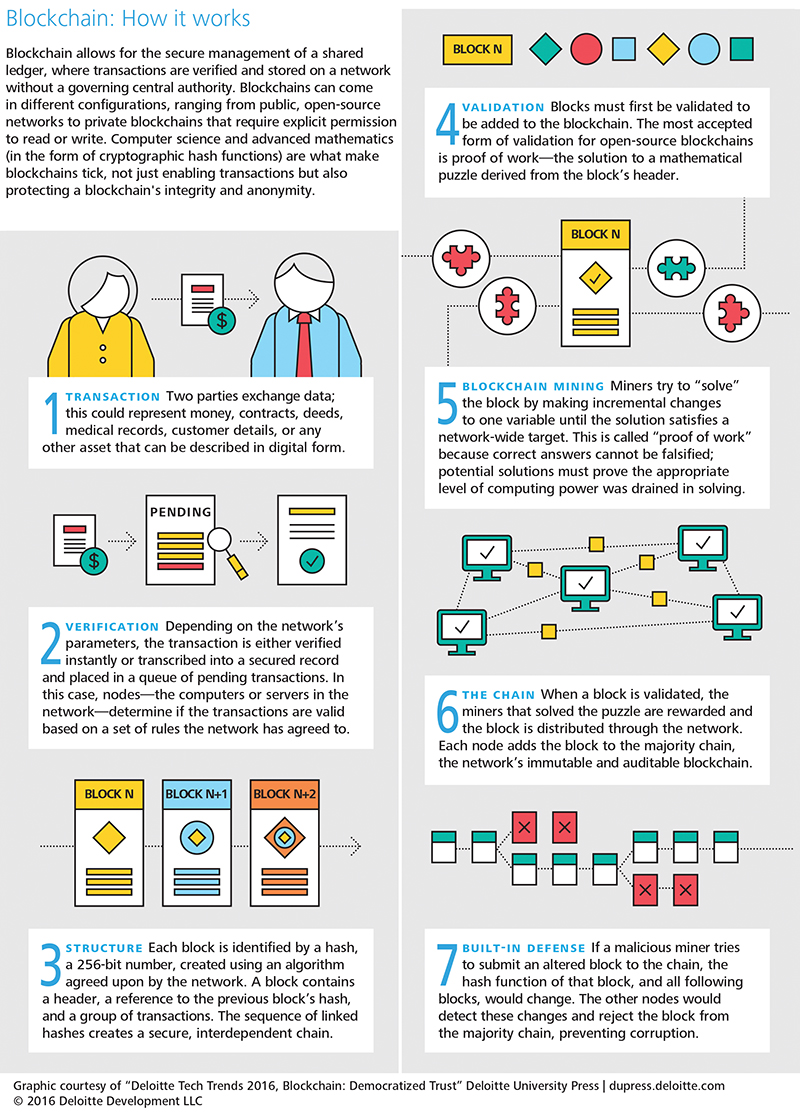Breaking the Chain
How blockchain, the very legitimate technology behind cryptocurrencies, might change accounting and finance forever—in a good way.
By Lisa Wilder | Fall 2017

Consider a technology that could make traditional reconciliation
obsolete—a cloud-based, crowdsourced digital ledger
where every transaction is recorded and verified by users in
real time based on an honor system between all participants.
Now, consider this technology is rooted in the alternate currency
movement—aka cryptocurrency—with all the requisite
concerns about security, access, and trust that go with it.
Could the accounting and finance industry possibly adopt
such a technology?
Welcome to the blockchain discussion.
Blockchain or Bust
In case you haven’t heard, and you wouldn’t be the only
one—a recent Deloitte survey indicated that about 40
percent of senior U.S. executives haven’t—blockchain
technology is sparking an operations revolution in practically
every industry on the planet. The race is on to adapt
the open-source, live entry-and-verification technology behind
the soaring cryptocurrencies Bitcoin and Ether to
streamline recordkeeping and business transactions in disciplines
spanning from cross-border financial transactions
to supply chain management.
But what is blockchain?
In the simplest terms, a blockchain is a distributed digital
ledger that records and executes transactions without the
need of a middleman. And it’s all based in what many in the
accounting and finance profession still consider the ultimate
cultural and operational challenge—“accounting in the
cloud,” explains Lamont Black, assistant professor of finance
at DePaul University - Chicago. “Blockchain is really good
at recording a value and putting a timestamp on it. Instead
of everyone having their own files, they can go to one location
where everyone can agree on that shared information,
allowing it to be used centrally.”
Deloitte’s definition goes deeper: “[Blockchain] is a
distributed ledger that provides a way for information to be
recorded and shared by a community.” Every member of
this community maintains their own records, but “all
members must validate any updates collectively.” And we’re
not just talking about numbers. “The information could
represent transactions, contracts, assets, identities, or
practically anything else that can be described in digital
form. Entries are permanent, transparent, and searchable,
which makes it possible for community members to view
transaction histories in their entirety,” the firm explains.
And here’s where the name comes in. According to
Deloitte’s explanation, each update is a new “block” added
to the end of the “chain.” A central protocol is established
to determine how “new edits or entries are initiated,
validated, recorded, and distributed. With blockchain,
cryptology replaces third-party intermediaries as the keeper
of trust, with all blockchain participants running complex
algorithms to certify the integrity of the whole.”
Who knows what the future holds for this technology, but
today, a blockchain looks like a conventional database—just
one that moves and changes in real time. “It records all
processes, tasks, and payments and digitally stamps them.
It basically does what human intermediaries do now, but
without the potential for human error or tampering,”
explains W. Brooke Elliott, professor of accountancy
and department head at the University of Illinois at
Urbana-Champaign. “It’s protected from any type of
tampering or revision.”
Building a Chain
Deloitte is just one of many organizations exploring and
developing new ways to implement blockchain technology.
Another Big Four member, PwC, is investing heavily in
resources to develop blockchain applications and services.
Powerhouse names like Goldman Sachs, IBM, Intel, J.P.
Morgan Chase, Morgan Stanley, and Wal-Mart are just a few
others forming their own blockchain R&D collaborations.
Deloitte recently opened a global blockchain lab to develop
applications for the technology. According to Deloitte’s New
Jersey-based audit partner Will Bible, the development of
blockchain technology benefits from a vibrant global, opensource
community. “We’re seeing small groups of
entrepreneurs building their own solutions, with software
communities putting out their own platforms,” Bible explains. This open-source collaboration means
blockchain’s development won’t necessarily be led
by the computer and software industry—though
how it’s commercialized remains to be seen.
The decentralized computing network Ethereum, for
instance, has emerged as the latest platform of
choice for commercial blockchain development,
with some calling it “a more flexible and developer-friendly
alternative to Bitcoin with its native
cryptocurrency, Ether.”
Regardless of the platform, “blockchain is the real
innovation of Bitcoin,” Black says. “This technology
can be applied.”
The CPA Chain
There’s no clear answer as to how widely blockchain
technology will be applied, or how it will impact
accounting, finance, and tax professionals—yet. For
now, blockchain awareness is simply “important for
CPAs at all levels,” says Len Steinmetz, director,
Financial Services Advisory at Grant Thornton.
“It’s not generally expected that blockchain will
become the de-facto transactional standard at all
levels of the economy,” Steinmetz says, pointing to
current predictions that the early adopters will be
“top-tier financial corporations, asset managers, and
other large economic enterprises,” including “retail
banking transactors, payment system processors
(SWIFT already has a blockchain product in beta),
swap and other trading platforms.”
He adds, “For mid-tier firms, we’re probably looking
at a three-to-five-year horizon where small
businesses will likely be the last to adopt or may not
adopt outright, instead using platforms that use
blockchain technology ‘under the covers.’”
This means CPAs and other finance professionals
have some time to immerse themselves in
the technology and learn about its best implementations—
especially if they want to stay relevant to
their organizations and clients.
In other words, accountants and auditors won’t
be tossed out on the street, but now is a good time
to educate. Deloitte’s Bible says traditional
accounting support roles are likely to switch from
reconciliation to analysis. This technology will
automate many job functions, but also “create
opportunities for analytics,” Bible notes, and firms
will obviously be looking for job candidates with
the latest technical skills.
Take traditional double-entry bookkeeping, for
instance. According to Steinmetz, accounting
reconciliation typically depends on independent
auditors to verify entries and validate financial
information. Depending on the design of the
blockchain system, once data is entered, it’s subject
to an immediate verification process that refines or
completely eliminates this manual job function.
“Blockchain addresses these concerns by, first,
distributing identical copies of the ledger to each
member in the network (so everyone has the same
view into the transaction at the same time); second,
identifying ownership and transfer of ownership;
and third, cryptographically securing the ledger and
each transaction in a managed and immutable
way,” Steinmetz explains.
Then consider triple-entry bookkeeping and
momentum accounting. Blockchain is seen as a
potential modern driver of these proposed
alternative accountancy systems, which not only
focus on the traditional process of recording debits
and credits, but also monitor and note real-time
changes in balances.
The blockchain future means “the accountant and
auditor function would deal less with the mundane
and more with truly complex transactions. [It’s a
future] where today’s CPAs will make significant
value-add contributions,” Steinmetz adds.
The blockchain future can also potentially change
accounting coursework worldwide. Steinmetz
thinks training will have to change in two key ways:
Accounting majors will need a “firm grounding” in
“distributed ledger technology, cryptography,
security, and operation of trusted and trustless
networks.” Plus, they’ll need to build “a good
understanding of the coming world of blockchain
or ‘triple-entry’ accounting.”
DePaul University and the University of Illinois are
among many institutions responding to these
developing technologies with increasing levels of
computer science coursework.
“When I moved to Chicago in 2013, I was teaching
money and banking—I was talking about how
technology is changing the [finance] space. Even
then, my students wanted to know about Bitcoin
and the technology behind it,” Black says. “Today,
the school is developing a blockchain curriculum
that involves more conversation with faculty in
computer science.”
At the University of Illinois, Elliott just led a major
undergraduate curriculum revision in the College of
Business to build analytics and other technology-related
courses into its core. “We’ve always
produced accounting professionals with a solid
understanding of accounting fundamentals and
an ability to communicate well with colleagues
and clients, but now we’re investing to produce
accounting professionals who also have a
competency in data analytics and emerging
technologies,” she says. “In our masters programs
in accountancy, we’re launching a data analytics
concentration where students will have the ability
to build a core competency in analytics and apply
these skills to develop solutions to problems
identified in the accounting discipline.”
As for what the future holds for these students
and the profession, Elliott says don’t believe
everything you read.
“I don’t believe it’s the end of the audit industry by
any means, as has been referenced in several
popular press articles,” she says. “As long as there’s
estimation in financial reports, and there always will
be, then technology alone cannot substitute the
value [we] provide.”
